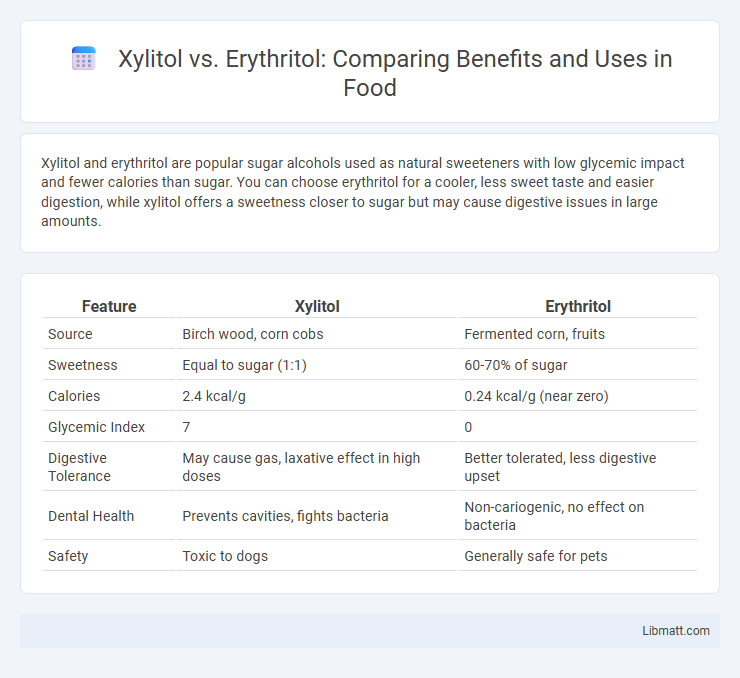Xylitol and erythritol are popular sugar alcohols used as natural sweeteners with low glycemic impact and fewer calories than sugar. You can choose erythritol for a cooler, less sweet taste and easier digestion, while xylitol offers a sweetness closer to sugar but may cause digestive issues in large amounts.
Table of Comparison
| Feature | Xylitol | Erythritol |
|---|---|---|
| Source | Birch wood, corn cobs | Fermented corn, fruits |
| Sweetness | Equal to sugar (1:1) | 60-70% of sugar |
| Calories | 2.4 kcal/g | 0.24 kcal/g (near zero) |
| Glycemic Index | 7 | 0 |
| Digestive Tolerance | May cause gas, laxative effect in high doses | Better tolerated, less digestive upset |
| Dental Health | Prevents cavities, fights bacteria | Non-cariogenic, no effect on bacteria |
| Safety | Toxic to dogs | Generally safe for pets |
Introduction to Xylitol and Erythritol
Xylitol and erythritol are popular sugar alcohols used as low-calorie sweeteners in various food products. Xylitol, derived from hardwood and corn cobs, contains about 2.4 calories per gram and has a glycemic index of 7, whereas erythritol, naturally found in fruits and fermented foods, provides around 0.24 calories per gram with a near-zero glycemic index. Both offer dental benefits and low impact on blood sugar, making them preferred alternatives for diabetics and those seeking sugar reduction.
Chemical Structure and Origins
Xylitol is a five-carbon sugar alcohol derived primarily from birch wood or corn fiber, exhibiting a molecular formula of C5H12O5. Erythritol, with a four-carbon structure and molecular formula C4H10O4, is naturally found in fruits and fermented foods, commonly produced through fermentation of glucose by yeast or bacteria. Both compounds belong to the polyol family, but their differing carbon counts influence their sweetness, metabolism, and applications in sugar-free products.
Sweetness Comparison
Xylitol and erythritol differ significantly in sweetness levels, with xylitol providing about 70% of the sweetness of sucrose and erythritol about 60%. Your choice depends on desired sweetness intensity and caloric impact, as xylitol contains calories while erythritol is almost calorie-free. Both sweeteners offer a sugar-like taste but erythritol's lower sweetness might require higher quantities to match xylitol's effect in recipes.
Caloric Content and Glycemic Impact
Xylitol contains about 2.4 calories per gram and has a low glycemic index around 13, causing a moderate blood sugar increase compared to sugar. Erythritol provides almost zero calories at 0.24 calories per gram and has a glycemic index of zero, making it suitable for diabetics and those managing blood sugar levels. Both sugar alcohols offer low glycemic impacts but erythritol is preferable for stricter caloric and glycemic control.
Health Benefits and Potential Risks
Xylitol and erythritol are popular sugar substitutes known for their low glycemic index and dental health benefits, with xylitol helping reduce cavity-causing bacteria and erythritol acting as an antioxidant. Both sweeteners offer fewer calories than sugar, supporting weight management and blood sugar control, but excessive consumption may cause digestive discomfort, especially xylitol, which can lead to bloating and diarrhea. Your choice between xylitol and erythritol depends on personal tolerance and health goals, as erythritol is generally better tolerated with fewer gastrointestinal side effects.
Tooth-Friendly Properties
Xylitol and erythritol are both sugar alcohols known for their tooth-friendly properties, significantly reducing the risk of cavities by inhibiting the growth of cavity-causing bacteria like Streptococcus mutans. Xylitol has been extensively studied and shown to promote saliva production, which helps neutralize acids and repair tooth enamel. Your dental health benefits from including either sweetener as a sugar alternative that supports oral hygiene without contributing to tooth decay.
Effects on Gut Health and Digestion
Xylitol and erythritol impact gut health and digestion differently due to their fermentation properties; xylitol is partially fermented by gut bacteria, potentially causing gas and bloating in sensitive individuals, while erythritol is mostly absorbed in the small intestine and excreted unchanged, resulting in minimal digestive discomfort. Erythritol's lower fermentation reduces the risk of gastrointestinal issues, making it better tolerated for those with sensitive digestive systems. Both sugar alcohols have low glycemic indexes, but erythritol's minimal fermentation offers a gentler effect on gut microbiota balance compared to xylitol.
Safety and Side Effects
Xylitol and erythritol are both sugar alcohols generally recognized as safe by the FDA, with erythritol exhibiting a more favorable gastrointestinal tolerance and lower likelihood of causing digestive issues. Xylitol consumption, especially in large amounts, can lead to symptoms like bloating, gas, and diarrhea, and it poses a severe toxicity risk to dogs. Erythritol is absorbed into the bloodstream and excreted in urine mostly unchanged, resulting in minimal fermentation in the gut and fewer side effects.
Best Uses in Cooking and Baking
Xylitol excels in baking recipes requiring moisture retention and a caramel-like sweetness, making it ideal for cookies, cakes, and frostings. Erythritol's low glycemic index and cooling effect suit sugar-free beverages, smoothies, and cold desserts such as ice cream. Both sweeteners maintain stability under moderate heat but erythritol tends to crystallize more, influencing texture in certain baked goods.
Choosing Between Xylitol and Erythritol
Choosing between xylitol and erythritol depends on factors like sweetness level, caloric content, and digestive tolerance. Xylitol offers a sweetness similar to sugar with about 2.4 calories per gram and can promote dental health, while erythritol is less sweet, nearly calorie-free, and typically causes fewer digestive issues. Consumers seeking a lower-calorie option with minimal gastrointestinal effects often prefer erythritol, whereas those prioritizing dental benefits might opt for xylitol.
Xylitol vs Erythritol Infographic

 libmatt.com
libmatt.com